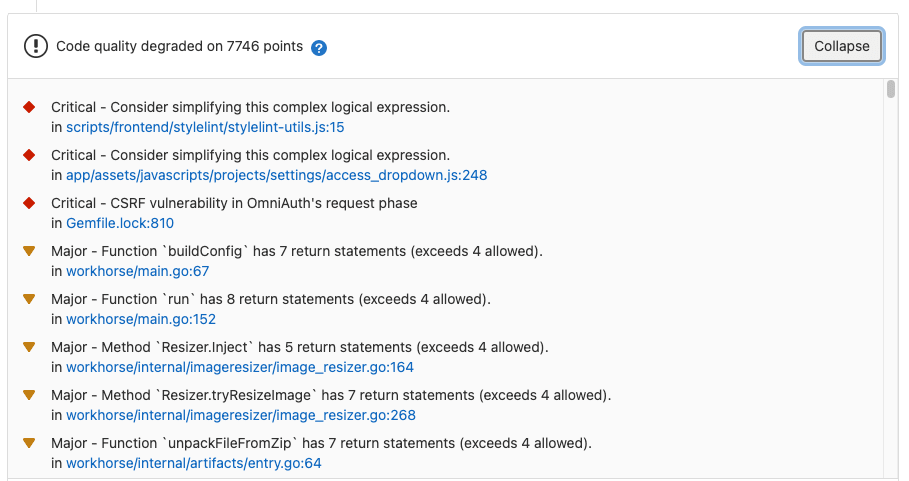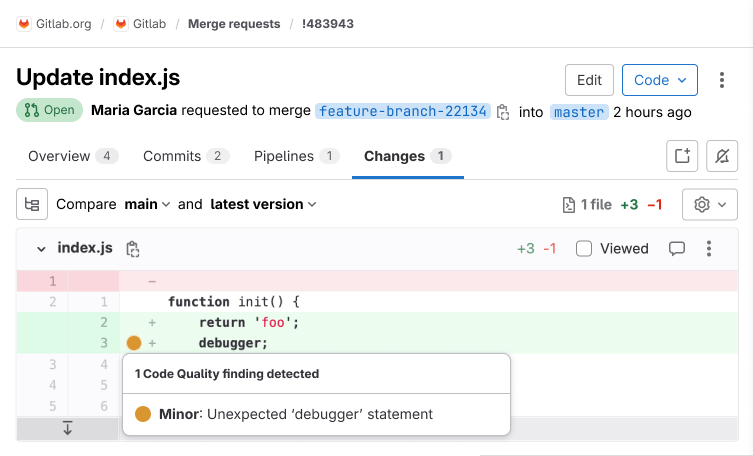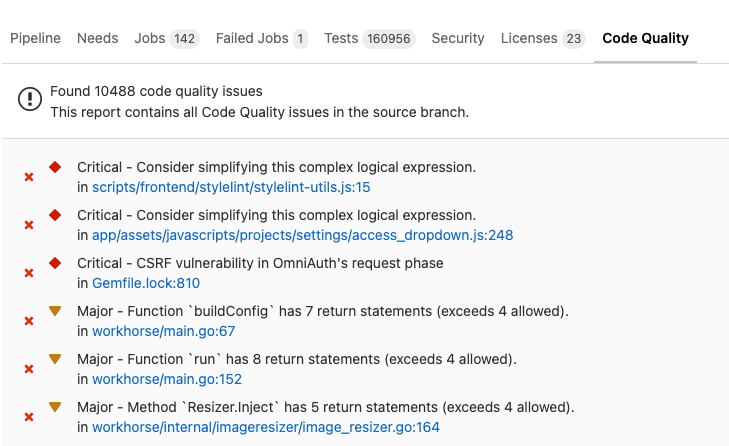Code Quality
DETAILS: Tier: Free, Premium, Ultimate Offering: GitLab.com, Self-managed, GitLab Dedicated
- Moved to GitLab Free in 13.2.
Use Code Quality to analyze your source code's quality and complexity. This helps keep your project's code simple, readable, and easier to maintain. Code Quality should supplement your other review processes, not replace them.
Code Quality runs in CI/CD pipelines, and helps you avoid merging changes that would degrade your code's quality.
Code Quality uses the open source Code Climate tool, and selected plugins, to analyze your source code. To confirm if your code's languages are covered, see the Code Climate list of Supported Languages for Maintainability. You can extend the code coverage either by using Code Climate Analysis Plugins or a custom tool.
Features per tier
Different features are available in different GitLab tiers, as shown in the following table:
| Feature | In Free | In Premium | In Ultimate |
|---|---|---|---|
| Configure scanners | {check-circle} Yes | {check-circle} Yes | {check-circle} Yes |
| Integrate custom scanners | {check-circle} Yes | {check-circle} Yes | {check-circle} Yes |
| Generate JSON or HTML report artifacts | {check-circle} Yes | {check-circle} Yes | {check-circle} Yes |
| Findings in merge request widget | {check-circle} Yes | {check-circle} Yes | {check-circle} Yes |
| Findings in pipelines | {dotted-circle} No | {check-circle} Yes | {check-circle} Yes |
| Findings in merge request changes view | {dotted-circle} No | {dotted-circle} No | {check-circle} Yes |
| Summary in project quality view | {dotted-circle} No | {dotted-circle} No | {check-circle} Yes |
View Code Quality results
Code Quality results are shown in the:
- Merge request widget
- Merge request changes view
- Pipeline details view
- Project quality view
Merge request widget
- Moved to GitLab Free in 13.2.
Code Quality analysis results display in the merge request widget area if a report from the target branch is available for comparison. The merge request widget displays Code Quality findings and resolutions that were introduced by the changes made in the merge request. Multiple Code Quality findings with identical fingerprints display as a single entry in the merge request widget, each individual finding is available in the full report available in the Pipeline details view.
Merge request changes view
DETAILS: Tier: Ultimate Offering: GitLab.com, Self-managed, GitLab Dedicated
- Introduced in GitLab 13.11, disabled by default behind the
codequality_mr_difffeature flag.- Enabled by default in GitLab 13.12.
- Disabled by default in GitLab 14.0 due to this issue.
- Inline annotation added and feature flag removed in GitLab 14.1.
Code Quality results display in the merge request Changes view. Lines containing Code Quality issues are marked by a symbol beside the gutter. Select the symbol to see the list of issues, then select an issue to see its details.
Pipeline details view
DETAILS: Tier: Premium, Ultimate Offering: GitLab.com, Self-managed, GitLab Dedicated
The full list of Code Quality violations generated by a pipeline is shown in the Code Quality tab of the pipeline's details page. The pipeline details view displays all Code Quality findings that were found on the branch it was run on.
Project quality view
DETAILS: Tier: Ultimate Offering: GitLab.com, Self-managed
The project quality view displays an overview of the code quality findings. The view can be found under Analyze > CI/CD analytics, and requires project_quality_summary_page feature flag to be enabled for this particular project.
Enable Code Quality
Prerequisites:
- GitLab CI/CD configuration (
.gitlab-ci.yml) must include theteststage. - If you're using instance runners, the Code Quality job must be configured for the Docker-in-Docker workflow.
- If you're using private runners, you should use an alternative configuration recommended for running Code Quality analysis more efficiently.
- The runner must have enough disk space to store the generated Code Quality files. For example, on the GitLab project the files are approximately 7 GB.
To enable Code Quality, either:
-
Enable Auto DevOps, which includes Auto Code Quality.
-
Include the Code Quality template in your
.gitlab-ci.ymlfile.Example:
include: - template: Jobs/Code-Quality.gitlab-ci.ymlCode Quality now runs in pipelines.
WARNING: On self-managed instances, if a malicious actor compromises the Code Quality job definition they could execute privileged Docker commands on the runner host. Having proper access control policies mitigates this attack vector by allowing access only to trusted actors.
Improve Code Quality performance with private runners
If you have private runners, you should use this configuration for improved performance of Code Quality because:
- Privileged mode is not used.
- Docker-in-Docker is not used.
- Docker images, including all CodeClimate images, are cached, and not re-fetched for subsequent jobs.
This alternative configuration uses socket binding to share the Runner's Docker daemon with the job environment. Before implementing this configuration, consider its limitations.
To use private runners:
-
Register a new runner:
$ gitlab-runner register --executor "docker" \ --docker-image="docker:latest" \ --url "https://gitlab.com/" \ --description "cq-sans-dind" \ --tag-list "cq-sans-dind" \ --locked="false" \ --access-level="not_protected" \ --docker-volumes "/cache"\ --docker-volumes "/builds:/builds"\ --docker-volumes "/var/run/docker.sock:/var/run/docker.sock" \ --registration-token="<project_token>" \ --non-interactive -
Optional, but recommended: Set the builds directory to
/tmp/builds, so job artifacts are periodically purged from the runner host. If you skip this step, you must clean up the default builds directory (/builds) yourself. You can do this by adding the following two flags togitlab-runner registerin the previous step.--builds-dir "/tmp/builds" --docker-volumes "/tmp/builds:/tmp/builds" # Use this instead of --docker-volumes "/builds:/builds"The resulting configuration:
[[runners]] name = "cq-sans-dind" url = "https://gitlab.com/" token = "<project_token>" executor = "docker" builds_dir = "/tmp/builds" [runners.docker] tls_verify = false image = "docker:latest" privileged = false disable_entrypoint_overwrite = false oom_kill_disable = false disable_cache = false volumes = ["/cache", "/var/run/docker.sock:/var/run/docker.sock", "/tmp/builds:/tmp/builds"] shm_size = 0 [runners.cache] [runners.cache.s3] [runners.cache.gcs] -
Apply two overrides to the
code_qualityjob created by the template:include: - template: Jobs/Code-Quality.gitlab-ci.yml code_quality: services: # Shut off Docker-in-Docker tags: - cq-sans-dind # Set this job to only run on our new specialized runner
Code Quality now runs in standard Docker mode.
Run Code Quality rootless with private runners
If you are using private runners and would like to run the Code Quality scans in rootless Docker mode code quality requires some special changes to allow it to run properly. This may require having a runner dedicated to running only code quality jobs because changes in socket binding may cause problems in other jobs.
To use a rootless private runner:
-
Register a new runner:
Replace
/run/user/<gitlab-runner-user>/docker.sockwith the path to the localdocker.sockfor thegitlab-runneruser.$ gitlab-runner register --executor "docker" \ --docker-image="docker:latest" \ --url "https://gitlab.com/" \ --description "cq-rootless" \ --tag-list "cq-rootless" \ --locked="false" \ --access-level="not_protected" \ --docker-volumes "/cache" \ --docker-volumes "/tmp/builds:/tmp/builds" \ --docker-volumes "/run/user/<gitlab-runner-user>/docker.sock:/run/user/<gitlab-runner-user>/docker.sock" \ --token "<project_token>" \ --non-interactive \ --builds-dir "/tmp/builds" \ --env "DOCKER_HOST=unix:///run/user/<gitlab-runner-user>/docker.sock" \ --docker-host "unix:///run/user/<gitlab-runner-user>/docker.sock"The resulting configuration:
[[runners]] name = "cq-rootless" url = "https://gitlab.com/" token = "<project_token>" executor = "docker" builds_dir = "/tmp/builds" environment = ["DOCKER_HOST=unix:///run/user/<gitlab-runner-user>/docker.sock"] [runners.docker] tls_verify = false image = "docker:latest" privileged = false disable_entrypoint_overwrite = false oom_kill_disable = false disable_cache = false volumes = ["/cache", "/run/user/<gitlab-runner-user>/docker.sock:/run/user/<gitlab-runner-user>/docker.sock", "/tmp/builds:/tmp/builds"] shm_size = 0 host = "unix:///run/user/<gitlab-runner-user>/docker.sock" [runners.cache] [runners.cache.s3] [runners.cache.gcs] -
Apply the following overrides to the
code_qualityjob created by the template:code_quality: services: variables: DOCKER_SOCKET_PATH: /run/user/997/docker.sock tags: - cq-rootless
Code Quality now runs in standard Docker mode and rootless.
The same configuration is required if your goal is to use rootless Podman to run Docker with code quality. Make sure to replace /run/user/<gitlab-runner-user>/docker.sock with the correct podman.sock path in your system, for example: /run/user/<gitlab-runner-user>/podman/podman.sock.
Disable Code Quality
The code_quality job doesn't run if the $CODE_QUALITY_DISABLED CI/CD variable
is present. For more information about how to define a variable, see
GitLab CI/CD variables.
To disable Code Quality, create a custom CI/CD variable named CODE_QUALITY_DISABLED, for either:
Customizing scan settings
The Code Quality scan settings can be changed using CI/CD variables
in .gitlab-ci.yml.
To configure the Code Quality job:
- Declare a job with the same name as the Code Quality job, after the template's inclusion.
- Specify additional keys in the job's stanza.
For an example, see Download output in HTML format.
Available CI/CD variables
Code Quality can be customized by defining available CI/CD variables:
| CI/CD variable | Description |
|---|---|
CODECLIMATE_DEBUG |
Set to enable Code Climate debug mode. |
CODECLIMATE_DEV |
Set to enable --dev mode which lets you run engines not known to the CLI. |
CODECLIMATE_PREFIX |
Set a prefix to use with all docker pull commands in CodeClimate engines. Useful for offline scanning. For more information, see Use a private container registry. |
CODECLIMATE_REGISTRY_USERNAME |
Set to specify the username for the registry domain parsed from CODECLIMATE_PREFIX. |
CODECLIMATE_REGISTRY_PASSWORD |
Set to specify the password for the registry domain parsed from CODECLIMATE_PREFIX. |
CODE_QUALITY_DISABLED |
Prevents the Code Quality job from running. |
CODE_QUALITY_IMAGE |
Set to a fully prefixed image name. Image must be accessible from your job environment. |
ENGINE_MEMORY_LIMIT_BYTES |
Set the memory limit for engines. Default: 1,024,000,000 bytes. |
REPORT_STDOUT |
Set to print the report to STDOUT instead of generating the usual report file. |
REPORT_FORMAT |
Set to control the format of the generated report file. Either json or html. |
SOURCE_CODE |
Path to the source code to scan. Must be the absolute path to a directory where cloned sources are stored. |
TIMEOUT_SECONDS |
Custom timeout per engine container for the codeclimate analyze command. Default: 900 seconds (15 minutes) |
Output
Code Quality outputs a report containing details of issues found. The content of this report is
processed internally and the results shown in the UI. The report is also output as a job artifact of
the code_quality job, named gl-code-quality-report.json. You can optionally output the report in
HTML format. For example, you could publish the HTML format file on GitLab Pages for even easier
reviewing.
Output in JSON and HTML format
To output the Code Quality report in JSON and HTML format, you create an additional job. This requires Code Quality to be run twice, once each for file format.
To output the Code Quality report in HTML format, add another job to your template by using
extends: code_quality:
include:
- template: Jobs/Code-Quality.gitlab-ci.yml
code_quality_html:
extends: code_quality
variables:
REPORT_FORMAT: html
artifacts:
paths: [gl-code-quality-report.html]Both the JSON and HTML files are output as job artifacts. The HTML file is contained in the
artifacts.zip job artifact.
Output in only HTML format
To download the Code Quality report in only HTML format, set REPORT_FORMAT to html, overriding
the default definition of the code_quality job.
NOTE: This does not create a JSON format file, so Code Quality results are not shown in the merge request widget, pipeline report, or changes view.
include:
- template: Jobs/Code-Quality.gitlab-ci.yml
code_quality:
variables:
REPORT_FORMAT: html
artifacts:
paths: [gl-code-quality-report.html]The HTML file is output as a job artifact.
Use Code Quality with merge request pipelines
The default Code Quality configuration does not allow the code_quality job to run on
merge request pipelines.
To enable Code Quality to run on merge request pipelines, overwrite the code quality rules,
or workflow: rules, so that they match your current rules.
For example:
include:
- template: Jobs/Code-Quality.gitlab-ci.yml
code_quality:
rules:
- if: $CODE_QUALITY_DISABLED
when: never
- if: $CI_PIPELINE_SOURCE == "merge_request_event" # Run code quality job in merge request pipelines
- if: $CI_COMMIT_BRANCH == $CI_DEFAULT_BRANCH # Run code quality job in pipelines on the default branch (but not in other branch pipelines)
- if: $CI_COMMIT_TAG # Run code quality job in pipelines for tagsUse a private container image registry
- Introduced in GitLab 13.7.
Using a private container image registry can reduce the time taken to download images, and also
reduce external dependencies. You must configure the registry prefix to be passed down
to CodeClimate's subsequent docker pull commands for individual engines, because of
the nested method of container execution.
The following variables can address all of the required image pulls:
-
CODE_QUALITY_IMAGE: A fully prefixed image name that can be located anywhere accessible from your job environment. GitLab container registry can be used here to host your own copy. -
CODECLIMATE_PREFIX: The domain of your intended container image registry. This is a configuration option supported by CodeClimate CLI. You must:- Include a trailing slash (
/). - Not include a protocol prefix, such as
https://.
- Include a trailing slash (
-
CODECLIMATE_REGISTRY_USERNAME: An optional variable to specify the username for the registry domain parsed fromCODECLIMATE_PREFIX. -
CODECLIMATE_REGISTRY_PASSWORD: An optional variable to specify the password for the registry domain parsed fromCODECLIMATE_PREFIX.
include:
- template: Jobs/Code-Quality.gitlab-ci.yml
code_quality:
variables:
CODE_QUALITY_IMAGE: "my-private-registry.local:12345/codequality:0.85.24"
CODECLIMATE_PREFIX: "my-private-registry.local:12345/"This example is specific to GitLab Code Quality. For more general instructions on how to configure DinD with a registry mirror, see Enable registry mirror for Docker-in-Docker service.
Required images
The following images are required for the default .codeclimate.yml:
codeclimate/codeclimate-structure:latestcodeclimate/codeclimate-csslint:latestcodeclimate/codeclimate-coffeelint:latestcodeclimate/codeclimate-duplication:latestcodeclimate/codeclimate-eslint:latestcodeclimate/codeclimate-fixme:latestcodeclimate/codeclimate-rubocop:rubocop-0-92
If you are using a custom .codeclimate.yml configuration file, you must add the specified plugins in your private container registry.
Use DockerHub with authentication
You can use DockerHub as an alternate source of the Code Quality images.
Prerequisites:
- Add the username and password as protected CI/CD variables in the project.
To use DockerHub, configure the following variables in the .gitlab-ci.yml file:
CODECLIMATE_PREFIXCODECLIMATE_REGISTRY_USERNAMECODECLIMATE_REGISTRY_PASSWORD
Example:
include:
- template: Jobs/Code-Quality.gitlab-ci.yml
code_quality:
variables:
CODECLIMATE_PREFIX: "registry-1.docker.io/"
CODECLIMATE_REGISTRY_USERNAME: $DOCKERHUB_USERNAME
CODECLIMATE_REGISTRY_PASSWORD: $DOCKERHUB_PASSWORDUse the Dependency Proxy
You can use a Dependency Proxy to reduce the time taken to download dependencies.
Prerequisites:
- Dependency Proxy enabled in the project's group.
To reference the Dependency Proxy, configure the following variables in the .gitlab-ci.yml file:
CODE_QUALITY_IMAGECODECLIMATE_PREFIXCODECLIMATE_REGISTRY_USERNAMECODECLIMATE_REGISTRY_PASSWORD
For example:
include:
- template: Jobs/Code-Quality.gitlab-ci.yml
code_quality:
variables:
## You must add a trailing slash to `$CI_DEPENDENCY_PROXY_GROUP_IMAGE_PREFIX`.
CODECLIMATE_PREFIX: $CI_DEPENDENCY_PROXY_GROUP_IMAGE_PREFIX/
CODECLIMATE_REGISTRY_USERNAME: $CI_DEPENDENCY_PROXY_USER
CODECLIMATE_REGISTRY_PASSWORD: $CI_DEPENDENCY_PROXY_PASSWORDImplement a custom tool
You can integrate a custom tool into GitLab to provide Code Quality reports.
The Code Quality report artifact JSON file must contain an array of objects with the following properties:
| Name | Description |
|---|---|
description |
A description of the code quality violation. |
check_name |
A unique name representing the static analysis check that emitted this issue. |
fingerprint |
A unique fingerprint to identify the code quality violation. For example, an MD5 hash. |
severity |
A severity string (can be info, minor, major, critical, or blocker). |
location.path |
The relative path to the file containing the code quality violation. |
location.lines.begin or location.positions.begin.line
|
The line on which the code quality violation occurred. |
NOTE: Although the Code Climate specification supports more properties, those are ignored by GitLab. The GitLab parser does not allow a byte order mark at the beginning of the file.
To implement a custom Code Quality tool:
- Define a job in your
.gitlab-ci.ymlfile that generates the Code Quality report artifact. - Configure the tool to generate the Code Quality report artifact as a JSON file that implements a subset of the Code Climate spec.
Example:
[
{
"description": "'unused' is assigned a value but never used.",
"check_name": "no-unused-vars",
"fingerprint": "7815696ecbf1c96e6894b779456d330e",
"severity": "minor",
"location": {
"path": "lib/index.js",
"lines": {
"begin": 42
}
}
}
]Integrate multiple tools
Code Quality combines the results from all jobs in a pipeline into a single gl-code-quality-report.json file. As a result, multiple individual tools can be used in a pipeline, either alongside, or in place of, the supported Code-Quality.gitlab-ci.yml template.
Here is an example that returns ESLint output in the necessary format:
eslint:
image: node:18-alpine
script:
- npm ci
- npx eslint --format gitlab .
artifacts:
reports:
codequality: gl-code-quality-report.jsonUsing Analysis Plugins
Code Quality functionality can be extended by using Code Climate Analysis Plugins.
For example, to use the SonarJava analyzer:
-
Add a file named
.codeclimate.ymlto the root of your repository -
Add the enablement code for the plugin to the root of your repository to the
.codeclimate.ymlfile:version: "2" plugins: sonar-java: enabled: true
This adds SonarJava to the plugins: section of the
default .codeclimate.yml
included in your project.
Changes to the plugins: section do not affect the exclude_patterns section of the default
.codeclimate.yml. See the Code Climate documentation on
excluding files and folders
for more details.



